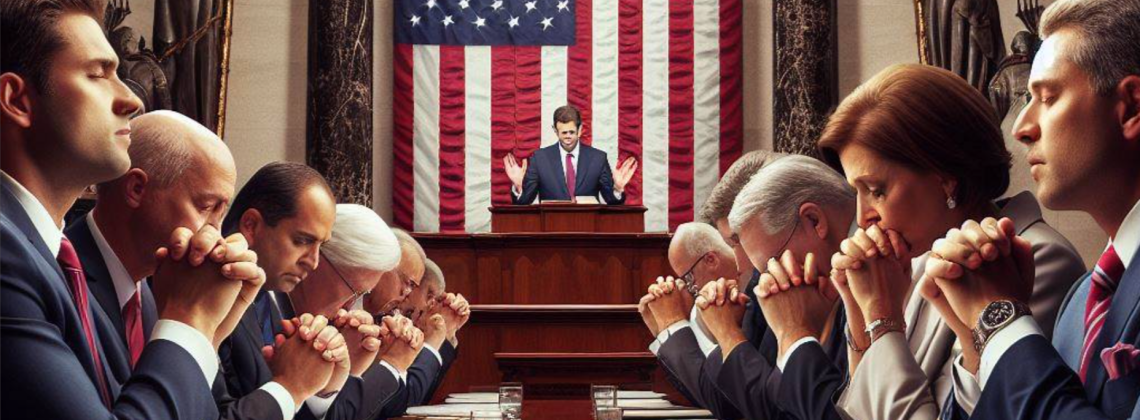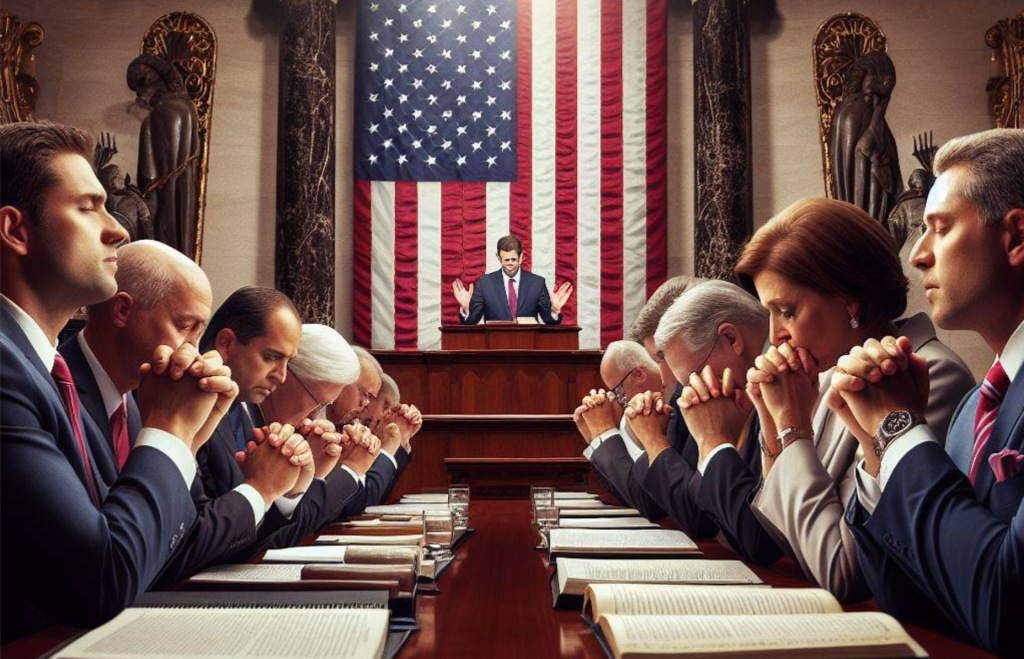

Carelessness with political labels weakens democracy
The election of Speaker Mike Johnson has predictably put Christian nationalism back in the headlines, abetted by scholars in my home discipline of the sociology of religion. It is worth recalling that as used in social science, the concept of Christian nationalism rose to prominence in the aftermath of Trump’s election in 2016. This connection seemed surprising, given the 45th President’s clear lack of Christian piety or social conservative bona fides. The paradox was explained thusly: Christian nationalism is about identity and power, not religion.
Yet our new Speaker, for whom by all appearances it does seem to be about religion, has been declared as pure a specimen of Christian nationalism as we have yet witnessed. While the shoe may fit Mike Johnson more readily than some others—Current’s editor has stated as much—it is difficult to escape the sense that the label would have eventually found its way to whoever ended up in the chair.
This conceptual turnabout is illustrative of a more general problem: Christian nationalism’s concept creep. As theorized by psychologist Nick Haslam, concept creep occurs when a harm-based concept is used to describe an increasingly broad range of phenomena. For instance, the term “bullying” was once reserved for cases in which a more powerful party intentionally harms a less powerful party, as in the classic case of a stronger child appropriating a weaker child’s lunch money. Over the years, however, it has expanded to include cases in which a person perceives themselves to be harmed by another, even in the absence of malice or any obvious power differential. So, one peer disparaging another’s favorite football team might be classified as bullying if the latter feels slighted, even if the remark was intended in jest. Haslam argues that such a transformation has occurred in the case of other concepts, such as abuse, trauma, and prejudice.
The consequences of concept creep are more than semantic. If the same term is used to describe both extreme and everyday phenomena, it becomes more difficult to articulate the difference between them. A stronger student terrorizing a weaker one may still be recognized as bullying, but the charge seems watered down when extended to incidents that may appear little more than excessive roughhousing.
Expanding concepts of harm also entails expanding the number of people classified as victims—and, by extension, as victimizers. This changes how we treat conflicts. In a disagreement between parties, we may seek mediation and compromise. If victimization has taken place, in contrast, the offending party warrants condemnation and punishment, perhaps including concrete consequences such as suspension, firing, or legal action. Concept creep thus raises the risk of disproportionate responses to what may be questionable harms.
What does any of this have to do with Christian nationalism, you may wonder? In my view, a great deal.
Though the concept predates January 6, the Capitol riot is the event that launched Christian nationalism to the forefront of American political discourse. Conversations on Christian nationalism frequently start with the insurrection, and news stories on the topic regularly feature photos from that day. The concept is closely linked in the public mind with violent, religiously themed right-wing extremism.
Yet the conversation rarely ends there. According to a now voluminous social scientific literature, the fruits of Christian nationalism entail a wide range of phenomena: right-wing populist fare such as support for Trump, dovishness toward Russia, or suspicion of immigrants; standard religious conservatism such as pro-life activism and religious liberty advocacy; typical conservative Protestant theological commitments like biblical literalism or premillennial eschatology; and conventional Republican mainstay positions such as Second Amendment support, free market economics, and judicial originalism. Given such an expansive conceptualization, it is little wonder that over half of Americans are said to be at least partial adherents of this toxic ideology.
This concept creep leads to the pitfalls noted by Haslam. With such a broad usage, the term “Christian nationalism” loses its descriptive utility. Recall, for instance, that the intended victim of January 6 was none other than Mike Pence, a card-carrying member of the Christian right. On the surface, the former vice president seems a far better advocate of “Christian America” than the mob’s catalyst, Donald Trump, and Pence, in his (now-defunct) presidential campaign, took pains to establish himself as an opponent of right-wing populism. Yet both Trump and Pence are said to be advocates of Christian nationalism. Trying to sort out just what Christian nationalism is supposed to be doing in American politics is confusing, to say the least.
If conceptual ambiguity were the only thing at stake the situation might be benign. But Christian nationalism operates as what we may call, following Haslam, a harm-based concept. This is where the term’s use moves from imprecise to pernicious. Characterizing a person, policy, or organization as “Christian nationalist” is ultimately an attribution of malicious intention. It is to declare that, at bottom, Speaker Johnson, the NRA, the Federalist Society, and the pro-life movement are all pushing for the same end as the January 6 rioters: the overturning of the American democratic system in behalf of their tribe of white identitarian Christians. Obviously there can be no common ground with such villains, just as there must not be with bullies or abusers. The entirety of the right is thus placed outside the boundaries of good-faith political discourse.
In this way, concept creep of politicized labels feeds directly into the dynamics driving political polarization. In 2020, a team of polarization researchers writing in Science described America as afflicted with “political sectarianism,” in which the members of each party have increasingly come to see the other as alien, evil, and existentially threatening. This radicalizes politics by raising the stakes, eroding common ground, and making each side more tolerant of its extremists. After all, in a struggle for survival, one cannot be choosy about allies or tactics.
It isn’t difficult to see how politicized labels like “Christian nationalism” play into political sectarianism. For those on the left, classifying opponents as Christian nationalists amplifies the perceived threat and provides permission to dismiss their stated positions as cover for authoritarian ambitions. This is not lost on conservative Christians, who, hearing the “Christian nationalist” epithet applied to even their most moderate positions, conclude that they have no place in the ostensible pluralistic democracy envisioned by their political rivals. Given the choice between seeking to dominate political life or being banned from it, we should not be shocked to see many Christians choose the former.
The whole point of liberal democracy is to avoid forcing this choice. Yet in a state of political sectarianism it feels like a constant presence. An expansive conceptualization of Christian nationalism thus prompts those on the left and right alike to think in such extreme and binary terms.
Ultimately, the use of “Christian nationalism” in our current discourse stands alongside woke, CRT, and fascist in serving to generate heat rather than light. In the short term, such labels may be effective in firing up the base. In the long term, however, a healthy political life will be one that eschews the wanton use of such labels.
Jesse Smith is professor of sociology at Benedictine College. His research is focused on the intersection of family, religion, and politics in the modern United States.
Great article. I’m working on the same topic, in a more academic paper way. Generally agree the term is bandied about without much concern over its precision.
Helpful reminder–thank you. It can be very easy to slip into this. I try to be careful in my talks on these topics.
I think another factor is religious illiteracy. A journalist, for instance, might be at an event where someone says that they want the Kingdom of God to come in this nation and they don’t hear it as a reference to the Lord’s Prayer but rather assume it is a programmatic statement for implementing an oppressive theocratic regime.
Great piece, Jesse. There is actually a movement afoot among some non-Christian and non-evangelicals academics, without a political or religious dog in the fight, to push back on how the phrase “Christian nationalist” is being used in political discourse. More on this as it develops.
Great thoughts on this new name for some old ways of thinking.
What do people who believe America was founded as a Christian nation and has been blessed by God because it is Christian (and Christian in the sense of evangelical Christian), and further believe that conservative Christians are destined to control all aspects of American life, would call their political/religious view? Christian patriotism? True Americanism? God’s American Faithful?
We may not want to be tainted by them because we might be conservative and Christian. But we have to talk about them. They exist. One of them is the Speaker of the House. What new term would work better?